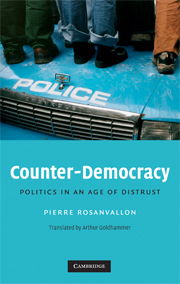Book contents
- Frontmatter
- Contents
- Foreword
- Introduction
- Part 1 Overseeing democracy
- Part 2 The sovereignty of prevention
- 5 From the right of resistance to complex sovereignty
- 6 Self-critical democracies
- 7 Negative politics
- Part 3 The people as judge
- Part 4 Unpolitical democracy
- 14 Conclusion: the modern mixed regime
- Index
- References
6 - Self-critical democracies
Published online by Cambridge University Press: 24 May 2010
- Frontmatter
- Contents
- Foreword
- Introduction
- Part 1 Overseeing democracy
- Part 2 The sovereignty of prevention
- 5 From the right of resistance to complex sovereignty
- 6 Self-critical democracies
- 7 Negative politics
- Part 3 The people as judge
- Part 4 Unpolitical democracy
- 14 Conclusion: the modern mixed regime
- Index
- References
Summary
In the first half of the nineteenth century, representative regimes everywhere chose institutional architectures that reflected a liberal concern with limiting the power of government. Constitutional engineering was not the focal point of democratic demands at the time, however. It seemed clear that universal suffrage was the primary goal, the central thread of the history of democracy in this period, although the precise chronology varied from country to country. Throughout this long struggle it was expected that universal suffrage would yield everything people desired. It would create a society in which each person had his or her place. It would put an end to corruption. It would ensure the triumph of the general interest. The rule of number would by itself lead to a democratic society. This state of mind was nicely summed up in 1848 by the Bulletin de la République, which greeted the advent of the vote for all in these terms: “As of the date of this law, there are no more proletarians in France.” Ledru-Rollin offered this lyrical comment: “Political science has now been discovered … From now on, it is a simple matter of applying it broadly.” These naïve hopes were soon to be disappointed. That is why the “social question” became central in discussions of political representation from this time forward.
- Type
- Chapter
- Information
- Counter-DemocracyPolitics in an Age of Distrust, pp. 150 - 172Publisher: Cambridge University PressPrint publication year: 2008



